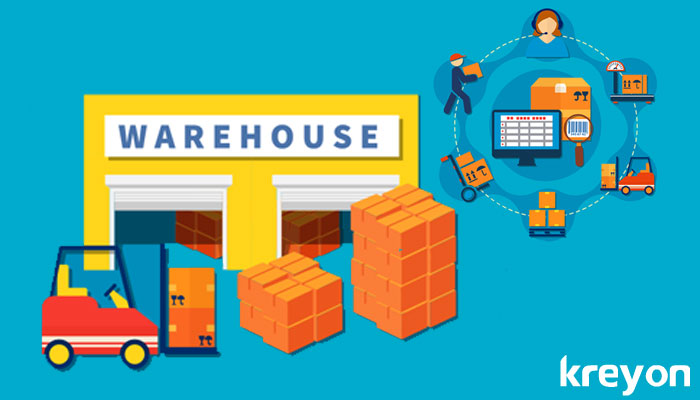8 Must Have features for Supply Chain Management Software

Supply chain management software is a must have requirement for modern businesses to track their operations in real time. It takes care of everything from the origin of your products and services to the point they’re delivered to your customers.
A cloud based software system can manage your supply chain with greater efficiency. It can help you automate operations end to end & track them from anywhere.
A better supply chain management can have significant impact on the company’s bottom line. It can help you uncover the bottlenecks that hold your business, improve resource usage & delivery. With a digital supply chain, your profit margin, speed and execution capabilities can be enhanced significantly. Here we look at some of the must have features for your SCM solution for great results.
1. Order Management:
Order, expenses & billing management should be tracked on high priority. Operation managers, accounting teams and departments should have integrated systems for procuring items & goods.
An integrated SCM system connects everyone, making billing and order management easier. The system can maintain the catalogue of items, products and services. It can also have reorder points, preferred vendors, packaging preferences etc.
Companies can also add specific checks and balances for procurements and approvals.

2. Inventory & Logistics Management:
Tracking and optimising inventory costs is a challenge in most companies. It is fairly common to have unused lying inventory items. But with an SCM system, the inventory can be tagged using Barcode, RFID and QR code based systems.
The real time inventory position, location and status can be tracked using a centralised SCM system. The SCM system allows organisations to verify inventory quantity and track missing or damaged items. The QR code driven SCM systems can allow you to scan, verify, track and see inventory usage on your mobile devices.
It helps them track inventory alloted to users, manage warehouses, look at value of inventory etc. An SCM systems allows optimised procurement. It helps companies make the right decisions for reordering items to meet the demand of goods.
3. Product Manufacturing:
A good supply chain system helps a company to build and manufacture their products better. It maps the customer orders and demand with the current manufacturing process to close out the gap.
The supply chain management software has the capability to create orders, track manufacturing of goods and charge customers from a centralised location.
The system makes things highly configurable to meet the needs of various customers as per their locations and specific preferences. The SCM makes product manufacturing and delivery process more customer oriented.

4. Supply Chain Planning:
Supply chain planning is essential to the success of a company. How your organisation builds its products and services for the end customers play a key role in its success.
The way demand forecasting is done, the products are built and delivered to customers can be improved with data analytics. The demand forecast can be mapped against the customers orders from previous time periods and advanced analytics tools.
The key is to reduce and regulate costs, but build enough products to serve customer orders across locations. Automated forecasting allows companies to procure only what is required, serve multiple locations and eliminate resource wastage.
5. Warehouse Management:
Stock & warehouse management is an integral part of SCM system. The SCM system allows companies to manage its warehouses in multiple locations. The logistics costs are calculated to serve customers from the nearest warehouses.
The warehouse management software allows the companies to use its warehouses optimally, transportation and meet the demands of the customers dynamically. The logistics tracking replenishes the stock, helps in movement of inventory items, and insurance etc. for goods. The compliance and safety needs of a warehouse can also be managed effectively with an SCM solution.

6. Collaboration & Delivery
The ultimate aim of an SCM software is to improve the collaboration between the company and its customers. The end to end process from the point of origin to customer delivery can be improved using the SCM system.
The SCM software helps teams to get access to data on the status of items or shipments, look at inventory positioning and improve the overall process for delivering goods to customers.
The features in the system allow multiple stakeholders to work together, communicate effectively and get information in real time. It reduces manual updates, mistakes and brings automation for improving collaboration.
The use of SCM systems can help organisations scale up their operations and make things structured. It also helps organisations develop a better understanding of their own business processes.
7. Operational Control with Data
The SCM systems today are equipped with strong data and analytics capabilities. You can track the demand forecasts, the unutilised inventory items, do quality checks etc using business intelligence tools.
These tools give you an insight into the production and lifecycle management of your products. Organisations can look at their procurement cycles, quality of goods supplied by vendors, percentage of customers orders fulfilled on time, average resource utilisation, insurance claims, time delays, logistics costs and many other things.
The complete procurement, manufacturing, delivery and quality control can be driven by data. The advanced analytics tools give your business effective operational control of processes and improves them.
This data driven approach allows your company to build effective operational strategies to cut down costs, introduce innovation and build better products backed by facts and figures.

8. Digital, Agile & Mobile SCM
Today you can effectively run your complete SCM operations from your mobile device. The mobile driven SCM software allows you to track . With internet availability, it is possible to have a completely digital SCM.
A digital SCM collects data in an automated way using sensors and RFID devices. The data collection, automation and analysis leads to performance improvements. The real-time alerts via mobile apps to various stakeholders can help in resolving bottlenecks at the earliest.
Kreyon Systems has very good expertise in implementing end to end Supply Chain Management software solutions for various industries. Please get in touch with us, if you need any assistance.
